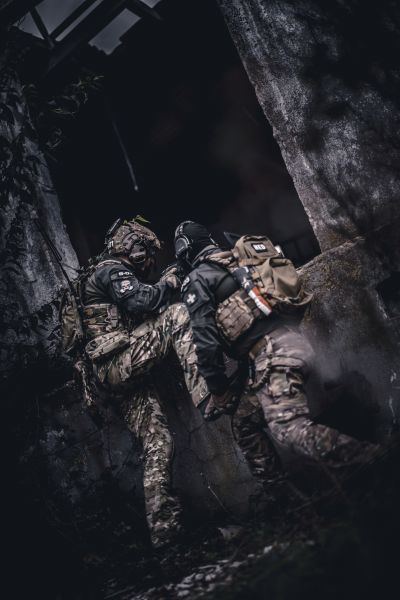

Every club has a president. Every company has a boss. And every team has a captain or TL (team leader). In airsoft, and especially when playing as a team, this figure takes on special importance. He is the one who is in control, who guides, who gives the orders, who makes the decisions.
Often times people think that decision making is something simple, a job that everyone can do. But it is actually easy to prove otherwise; take a step forward, adopt the role in a game or milsim and find out that it is not as easy as it may seem from the outside. Issues such as pressure, the fun of your colleagues and the resolution of the objectives, sometimes depend on decisions that you must make in a few seconds.
MENTALITY
Here lies the full potential of this role. The team leader must have a very observant and analytical mentality. He must not let nerves or adrenaline get the better of him.
In first place, a TL must be mentally reviewing the position of its operators at all times. There must be a good communication system in the team and if the team is divided into pairs, squads or patrols, maintaining constant communication with the other TLs or ICs (in command). At this point I would add that, from my own experience, the team is grateful that the TL are constantly talking to each other on the radio channel, informing of their location, showing that they have the situation under control, because this gives the team a feeling of safety and it allows you to be more relaxed.

We must admit that it is a second-line role. A TL cannot be at the forefront, because he would fall easily and leave the team with a leadership gap, which would create confusion if a second in command has not been appointed beforehand. In the same way that if you were escorting a VIP, the TL must adopt a position within the team, always a risky-free position, from which to see clearly all the environment and in case of contact, have a complete view of the battlefield.

He must have a continuously analytical vision. Analyse the terrain in which the team is moving or will move through. In case of ambush, you have to know where to fire, how to make the most of the advantages the terrain gives you, and avoid all those things that may be a problem. Analyse also the organisation of your team, if they are working in pairs, patrols or just as a squad. And also their weapons, whether you have support, snipers and even recon tools (drones, mobility, other friendly units in the area, etc).
And last but not least. Analyse the main mission, where can you move towards and why do so. This includes being aware of possible enemy positions, empathising with the enemy to try to avoid possible traps, or to attack them when they less expect it.
Something I have learned over time, especially in milsims, is that scouting is very important. Scouting consists of sending a couple of colleagues who can fend from themselves, go unnoticed, gather as much information as possible from the terrain, the area, the enemy, etc. and thus be able to act on more solid information later on.
 |
A TEAM LEADER MUST..
- A TL must constantly be mentally reviewing the position of the team.
- A TL must always be on the second line in order to be safe and able to manage the team.
- A TL must continuously analyse the terrain to be able to react faster and move the team better.




DECISIONS
And finally, the cornerstone of a TL's functions, his decisions. Just like a radio operator has to organise and ensure good communication between the different steps of a milsim or game, or a doctor is responsible for sending back to the game the casualties; a TL's job is to make decisions.
And this is not done by intuition or chance. He does this based on his knowledge of everything he has been able to gather, with good recon work or by ISR (intelligence, surveillance and reconnaissance)
 |
And often times the decisions are not simple. The success of the objective will depend on these decisions or they may decide the fate of your companions. There lies the importance of keeping a cold and analytical mind. A TL has to weigh the fire power available to him, make an estimated calculation to determine if the enemy outnumbers you, if it is beneficial to separate the team or not, the risks of attacking a defensive position, or to move forward depending on the type of terrain, etc.
Sometimes the best decision will be to fall back, because engaging in combat would mean losing many of the comrades and a significant delay in the main mission. Or maybe you can try to fight, but if there are no chances of success, you do not try again on the same place, but look for alternatives to not stagnate.

THINGS ON WHICH A TL BASES HIS DECISIONS:
- Information gathered by the scouts.
- Your team's fire power and enemy threat level.
- The priority in achieving the objective.
- The danger of casualties of the team a specific route may entail.
- The team's opinion (Beware! Never ask for it in combat situation or under stress).
- The fun for the team, after all, airsoft is just a game.


 |

It is very important to consider everyone’s opinion. Because, even if you are the TL and you are the one who has the last word, your colleagues may often have ideas that you had not thought of. But this is a double-edged sword. These opinions or suggestions should not be asked in times of stress or action, because they would create confusion. But rather during calm moments where you can talk and discuss without reaction time being a priority.
It is clear that after having made a decision and seeing its results, both the LT and the rest of the team members can think "what if we had done this instead of that" or "what about this instead of that other thing". But one thing is very clear:
There are no good or bad decisions, only those which all team mates follow and those they don’t.
And this is true, the success of a decision, whether it is the most appropriate or not, will greatly depend on whether everyone does it to support it instead of questioning it. A chain is as fragile as its weakest link.
Take my advice, when you are the TL, at the end of each game, milsim or mission, carry out a small meeting with the team, listen to the opinions and what they have to say. At what point, in their opinion, you made mistakes or you were right. It will help you improve day by day and also help them to see that their opinions matters. And it will have an impact on you and your future decisions.
So, as TL, always try to take care of the mission, the survival of the team and especially the fun of your colleagues, who have placed their trust in you to play this role and make decisions for all.


 |

LOADOUT

Finally, let's talk about the loadout that a TL should or can carry. After all, he is just another operator within a team and although it sounds obvious, he can play almost any game role. But it is true that there are game roles that fit better with the TL and others that simply don’t.
It is the case of: support, grenadier, even breacher. They are roles that, given their position within a team and their functions, can always maintain this panoramic view in combat and can be very well embodied with the role of TL. However, roles such as sniper or DMR are roles that sometimes require situations or distances that would make the job of a TL very difficult.
Also, I would add to the loadout something to write things down, a notebook and a couple of pens. Some system to quickly check documents, be it maps or other information, such as deployable pouches, wristbands with paper holder, etc. You will attend briefings, interrogate, talk with other TLs and, unless you have an outstanding memory, it is best to write everything down in order to be able to check it at any time, under stress, without stress, and anywhere.
 |



WHAT DOES A TEAM LEADER CARRY DURING A GAME?
- Notebook and pen, to write everything down
- Drop-down pouch or wrist straps
- Roles more compatible with a TL role: rifleman, support, grenadier, breacher, etc.
- Roles less compatible with a TL role: sniper, DMR, etc.
 |

As I explained at the beginning, the role of Team Leader is something that seems very simple but that is more complex once you look at it from within. I encourage you all to, within your teams, ask to be TL during a game. It will help you to see the burden it implies and, most importantly, from that moment forward, you will support the decisions of your TL much more decisively and with pleasure, since you will know what it is about.